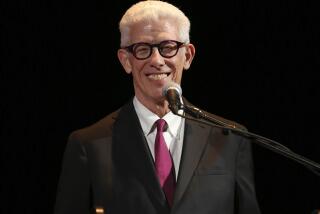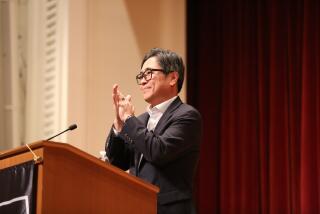James Broughton; S.F. Poet and Avant-Garde Filmmaker
- Share via
James Broughton, an avant-garde filmmaker and poet who was prominent in San Francisco’s art community, died Monday at his Port Townsend, Wash., home. He was 85.
He wrote more than 20 books of verse, including “The Ballad of Mad Jenny,” “True and False Unicorn” and “Odes for Odd Occasions.”
He considered himself “first and foremost a poet,” naming Bach, Blake, Mother Goose, Shakespeare and Yeats as among his greatest influences. Alan Watts, the late Buddhist scholar and philosopher, once called him the uncrowned poet laureate of San Francisco.
“True and False Unicorn,” published in 1957, was considered his strongest and most important long poem. Written in four sections, it is an exploration of identity, presenting a variety of historical and fantastical voices, including Sigmund of Vienna, Big Black Sambo, A Virgin and The Unicorn.
But Broughton perhaps earned more attention as a maker of experimental films. He received the American Film Institute’s lifetime achievement award in 1989 for his work in such films as “Dreamwood,” “The Pleasure Garden,” “The Golden Positions” and “This Is It.” Some of his films were shown at the Film Forum and the Whitney Museum of American Art in New York in the 1970s.
He celebrated children, nature, the body and the spirit, gender ambiguity, and heterosexual and homosexual love. “The Bed,” made in 1967, was described by Linda Gross in The Times as “quintessentially Broughton and quintessentially 1960s.” It focused on an ornate bed in a meadow where life’s most significant moments occurred: birth, sex and death. The cast included Watts, Imogen Cunningham, Broughton and other San Francisco artists and writers, all performing in the nude.
His 1974 “Testament” showed the bushy-browed artist prancing into a graveyard in Modesto dressed in a Renaissance cloak, accompanied by a parade of Felliniesque characters.
“Devotions,” made in 1983 with Joel Singer, presented a gay paradise where men made love instead of war.
“I’m not kidding when I say I believe in ecstasy for everyone and I also believe love should be the primary thing taught, not civics!” he said in a 1979 interview.
Broughton was born in Modesto and educated at a military school in Marin County and at Stanford University. He arrived in San Francisco in 1949, joining Kenneth Rexroth and others in a postwar period of poetry renaissance. He taught at San Francisco State University and the San Francisco Art Institute for many years before moving to Washington in the late 1980s.
He began making films in the mid-1940s and is considered by some the father of West Coast independent cinema.
He also was a playwright, writing plays for San Francisco’s Playhouse Repertory Theater in the late 1950s and 1960s.
Broughton was married in the 1960s to Suzanna Hart, with whom he had two children. In his later years he lived with his companion and longtime collaborator, Singer. He is survived by his son, Orion, of Port Townsend, daughter, Serena DeCastro, of Colorado, and Singer.
More to Read
The biggest entertainment stories
Get our big stories about Hollywood, film, television, music, arts, culture and more right in your inbox as soon as they publish.
You may occasionally receive promotional content from the Los Angeles Times.











